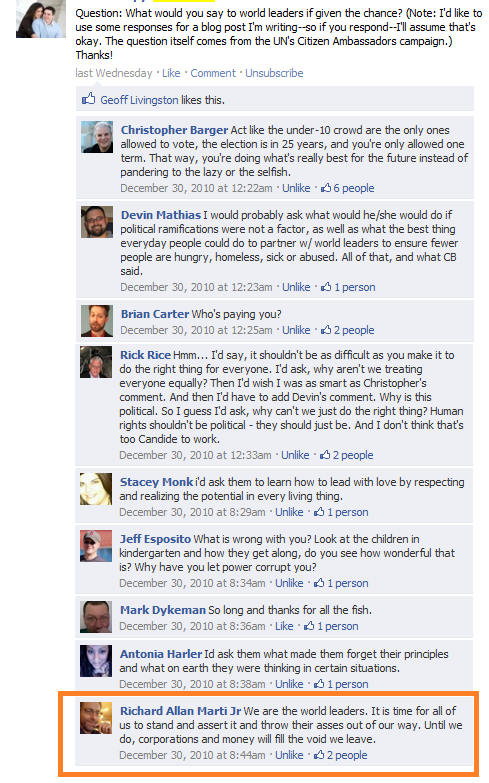Is foreign aid important to Americans? According to a recent poll, most Americans believe U.S. investment in foreign aid is 25% of the Federal budget, when the accurate figure is less than one percent. When asked what would be an appropriate percentage, the median amount shared was 10%. Yet–even that less than 1% is in jeopardy.
Earlier this week, ONE, USAID, FHI 360, PATH, Population Services International (PSI) and World Vision launched “The Power of 1%” campaign to highlight the economics of global health and the benefits U.S. investments overseas have for Americans at home. Having attended, I was reminded of the global health trifecta: what can happen when the power of 1%, the power of the media and the power of youth combine to influence and inspire good.
The Power of 1%
When it comes to emphasizing the true power of 1%, it’s important to not only look at the positive impact it has on the individuals and communities it supports. It also serves to improve the economy here at home and help increase national security. In August 2010, Sec. of State Hillary Clinton announced the State Department’s Global Health Initiative, working to improve global health as a way to achieve diplomacy.
“We know that the health of people in any nation is inextricably linked to the growth of its economy and security,” said Donald Steinberg, Deputy Administrator for USAID, “We invest in the health of developing nations because it is the right thing to do, and because our economy and security is dependent upon it as well.”
Addressing global health is now a part of the U.S.’ international diplomacy efforts as well as on our health agenda. The U.S. Department of Health and Human Services added global health as a new area of focus for its Healthy People 2020 initiative (disclaimer: client) which was released in December 2010. The Healthy People 2020 global health topic area looks to address five specific objectives to “improve public health and strengthen U.S. national security through global disease detection, response, prevention, and control strategies.”
Not only is funding critical to achieve these goals, but an important step will be enabling and empowering the global citizen to play an active role. Our world is growing (estimated to reach 7 billion by October 31) but it’s also shrinking. We are becoming more connected and more aware of the problems we face and the commonalities we share–mainly due to the next component in the trifect, the power of media.
The Power of Media
9 in 10 adults agree that digital technology can turn interest in a cause into a movement. Facebook has over 800 million active users and is translated in 70 languages. Six in ten Americans go online wirelessly using a laptop or cell phone. 86% of adults ages 18-29 use social networking.
We’ve already seen the power of media at work. Online fundraising raised over $20 billion dollars in 2010. Technology is saving lives and enabling communication. Community-funded journalism and citizen journalists are changing how the news is reported. Add to this innovations such as Random Hacks of Kindness, Code for America, Crisis Camps, Ushahidi, accessible health data and a slew of additional examples. And it’s not just digital technology and the mobile Web at work.
ABCNews was awarded for its global health coverage. In December 2010, ABC News launched a year-long effort to provide coverage on global health in the developing world with the help of a grant from the Bill & Melinda Gates Foundation. Today, ABCNews continues its commitment to global health through it’s One Million Moms Challenge, which focuses on improving maternal health globally.
Media–no matter the form it takes–can help not only increase awareness but also inspire action.
The Power of Youth
“More than 60 percent of the world’s population is under the age of 30,” said Ronan Farrow, Special Advisor to the Secretary of State for Global Youth Issues, at a High Level Meeting on Youth, in the U.N. General Assembly this past July. “And that demographic, increasingly empowered by the new technologies that we’ve discussed…is increasingly a potential driver of great economic and social reform.”
Farrow, a dynamic speaker with genuine assertiveness in his belief in youth, also acknowledges that the “[youth] demographic can be one of the great threats to national, international, stability and security.” Data shows that 86% of all nations with new outbreaks of civil conflict have significant majorities under the age of 30. This is one reason why the U.S. State Department has created its new Office of Global Youth Issues which Farrow leads.
“The United States is focusing on economic empowerment, through programs around the world that educate, create employment opportunities, and foster entrepreneurship for young people,” continued Farrow in his remarks. “We are launching initiatives that encourage civic participation, create local leadership opportunities, and develop linkages between young people and their governments.”
This is a call to action not only in our work abroad, but also here at home. How are you empowering youth in your community and in your work?
Start Today
At the event, organizers took video testimonies of what the power of 1% meant to attendees. To me, the power of 1% reminds me of how the heart of a person can inspire the power of a community for good. Funding and politics aside, one person can make a difference–and that’s what the campaign inspires. Somedays–it’s easy to forget the power you hold. Don’t doubt your purpose or question your mission. You were called for a reason.


